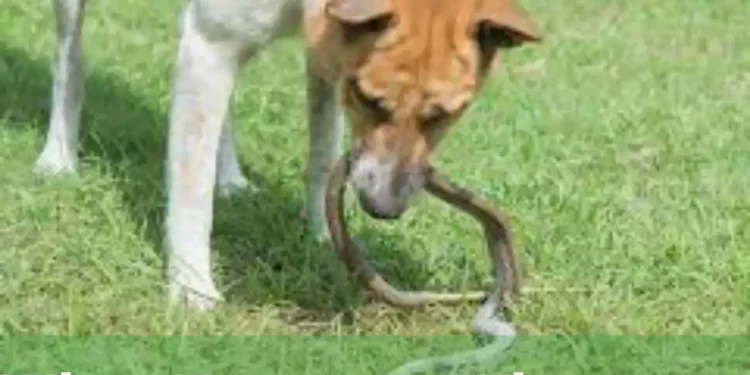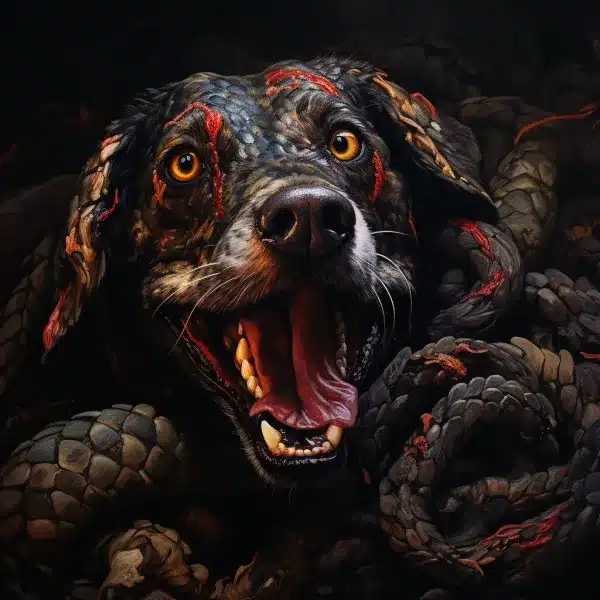What Happens When Dogs Eat Snakes

Dogs Eat Snakes: Most of our pet dogs may just bark at snakes and possibly turn away, and will only attack if the snake makes an advancement. However, some dogs will attack and attempt to kill the snake, they may get bitten or end up killing the snake and possibly eat the snake. So, What happens when dogs eat snakes?
There are lots of things that could happen when your dog eats a snake, but it depends on the kind or part of the snake the dog ate. This article will provide you with everything you should know concerning dogs eating snakes.

Types of snakes your dog could encounter
Non-venomous snakes
There are lots of snakes that don’t have venoms that your dog could come across, depending on the region you reside. These snakes could include corn snakes, garter snakes, and rat snakes. While these snakes may not be venomous, they could still pose some risk to your pooch; if eaten and swallowed by your pooch. For instance, your dog could face obstruction in its digestive system, or the snake’s skin or saliva could trigger allergic reactions.
Venomous snakes
A venomous snake will likely cause more problems for your dog as it could lead to tissue damage, internal bleeding, and in rare cases death. Identifying the venomous snakes peculiar to your region will help you take proactive measures.
What happens when dogs eat snakes?
You may have just walked in on your dog eating a snake that it rounded in the yard, or you may have just watched your dog kill and eat a snake and you’re wondering if it’ll cost its life or create health complications.
Dogs are usually fine when they eat snakes, but in some other cases, they may not be fine as a result of the type of snake they may have just eaten. Some snakes have lots of venoms that could prove fatal to dogs while others that don’t have venoms can be harbingers of parasites that could trouble your dog. If your dog eats a snake, you should consult your vet, however here are some indicators of parasite infestation:
Spirometra
Spirometra is a parasite that is usually gotten from reptiles, birds, and amphibians. When these parasites get into your dog’s body, they may experience loss in weight, vomiting, and diarrhea.
Spirometra infestation is not usually something to give yourself a headache about as they are rarely serious and can be easily treatable, but in some rare cases, it could cause death.
Upset Stomach
Just like newly introduce foods or treats, your dog could also face dealing with stomach upset if it’s just getting to eat a snake for the first time. It is no secret that a dog’s digestive system reacts in multiple ways to notable changes in diet.
A dog can eat a variety of foods without having many issues, but when this development is sudden, symptoms like vomiting, bloating, or diarrhea may occur.
Salmonella
Salmonella is not very dangerous to dogs because their stomach acid can usually kill it. However, sometimes the parasite can still make your dog sick. This can cause fever, loss of energy, diarrhea, and lack of interest in food.
What happens when dogs eat snakes’ skin?
Your dog may encounter a parasite or a snake’s skin. The snake’s skin is unlikely to cause harm. It is made of a protein called keratin. This protein forms nails, hair, and the outer layer of skin for humans and snakes. Keratin is also important for healing wounds.
What happens when my dog eats a snake’s head?
If your dog eats a snake’s head, it’s usually not harmful. The dog’s stomach acid can handle any bacteria or parasites. But if the snake is venomous, the dog will be okay. The venom needs to get into the dog’s bloodstream to have an effect. If the dog didn’t get bitten or injured, there’s no need to worry. The venom won’t get into the bloodstream if there are no wounds. However, it’s important to watch for any unusual signs and tell your vet right away.
My dog ate a snake, actions to take
Scan for possible snake bites
Your dog may be snacking on a snake, but that doesn’t mean the duel may have been a one-sided affair. There is a possibility that the snake bit your dog, but this can be a daunting task especially if your dog has long furs like my afghan hound.
Weakness or possible collapse are telling signs. Recovery is usually quick if prompt medical attention is meted. Paralysis, weakness, excessive drooling, and blood in their urine are also signs that your dog was bitten by a snake.
Monitor the dog
Observing your dog for signs of distress is crucial. If you have serious symptoms beyond vomiting, stomach pain, or diarrhea, call your vet. If possible, monitor for weeks to confirm parasite acquisition.
How to prevent such encounters from taking place in the future
Snake-Fencing
Snake-proofing your yard can negate possible encounters between your dog and a snake. Eliminate food sources, such as mice or rat infestation, and hide places such as woods or rocks. I installed a fence to ensure snakes are kept out of my house since is tay in a rural area.
Snake away and Natural repellents
The use of snake away and natural snake repellents can deter snakes from getting into your compound. I sprinkle the substance around the perimeter of my house. It can b very effective if you don’t have money to snake-proof your yard with a fence.
Train and supervise your dog
Training your dog with basic commands is helpful. These commands can stop the dog from eating harmful items like snakes.

What happens if my dog eats a snake? – Final thoughts
Your dog may sometimes hunt, kill and eat snakes in your yard, which means that the presence of snakes is attributed to the lack of effort in keeping them away. If you take the necessary precautions, such scenarios are less likely to happen. But in a situation where your dog eats snakes, you should scan for any bites and take prompt medical measures to ensure your pooch is safe.






